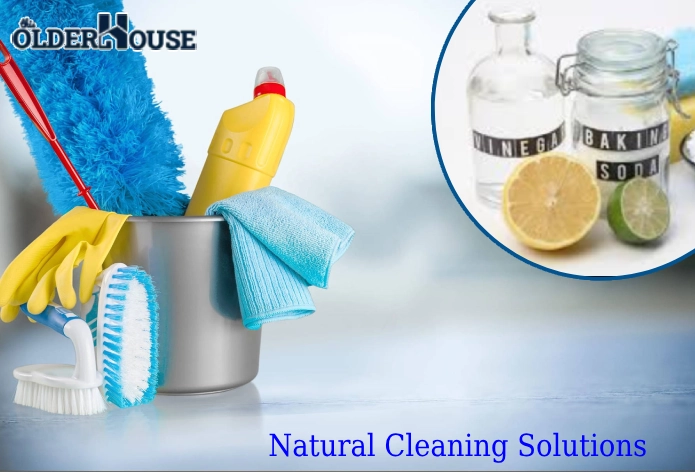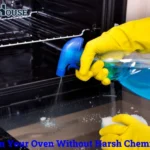Natural cleaning solutions have gained popularity not only for their effectiveness but also for their safety and environmental benefits. This article will explore the proven methods for achieving a naturally fresh home using these eco-friendly alternatives.
In recent years, there has been a significant shift towards eco-friendly and health-conscious living. This trend has extended to the way we clean our homes, with more people seeking natural alternatives to harsh chemical cleaners.
The Rise of Natural Cleaning Solutions
The demand for natural cleaning products has surged as consumers become more aware of the potential health risks associated with traditional cleaning chemicals. Many conventional cleaners contain volatile organic compounds (VOCs) that can contribute to poor indoor air quality and may cause respiratory issues, skin irritations, and other health problems. In response to these concerns, the market has seen a proliferation of eco-friendly cleaning options.
As of 2025, the trend towards natural cleaning solutions continues to grow. Consumers are increasingly prioritizing products that are not only effective but also safe for their families, pets, and the environment. This shift has prompted both established brands and new companies to develop innovative, plant-based formulations that can tackle tough cleaning tasks without compromising on safety or sustainability.
Benefits of Using Natural Cleaning Solutions
Improved Indoor Air Quality
One of the primary advantages of using natural cleaning products is the positive impact on indoor air quality. Unlike traditional cleaners that release harmful VOCs, eco-friendly alternatives use natural ingredients that do not emit toxic fume. This results in a cleaner, healthier indoor environment, which is particularly beneficial for individuals with asthma, allergies, or other respiratory concerns.
Reduced Health Risks
Natural cleaning solutions are typically free from harsh chemicals like ammonia, chlorine bleach, and artificial fragrances. By eliminating these potentially harmful substances from your cleaning routine, you can significantly reduce the risk of skin irritations, allergic reactions, and long-term health issues associated with chemical exposure.
Environmental Protection
Eco-friendly cleaning products are formulated with biodegradable ingredients that break down naturally without polluting water sources or harming aquatic life. Additionally, many natural cleaning brands prioritize sustainable packaging and manufacturing processes, further reducing their environmental impact.
Cost-Effective
While some natural cleaning products may have a higher upfront cost, they often prove to be more economical in the long run. Many natural ingredients, such as vinegar, baking soda, and lemon juice, are inexpensive and can be used for multiple cleaning purposes. Moreover, the concentrated nature of many eco-friendly cleaners means that a little goes a long way, reducing the need for frequent purchases.

Essential Ingredients for Natural Cleaning
To create effective natural cleaning solutions, it’s important to understand the key ingredients and their properties. Here are some of the most versatile and powerful natural cleaning agents:
White Vinegar
White vinegar is a staple in natural cleaning due to its acidic nature, which makes it effective at cutting through grease, removing stains, and killing bacteria. It’s particularly useful for cleaning windows, countertops, and appliances. However, it should be avoided on natural stone surfaces like marble or granite, as it can cause damage.
Baking Soda
Baking soda is an excellent natural abrasive and deodorizer. It can be used to scrub surfaces, remove tough stains, and neutralize odors. When combined with other natural ingredients, baking soda becomes even more powerful in tackling various cleaning challenges.
Lemon Juice
Lemon juice is not only a natural disinfectant but also leaves a fresh, clean scent. Its acidic properties make it effective at removing soap scum, hard water stains, and even rust. Additionally, lemon oil can be used as a natural wood polish and general-purpose cleaner.
Castile Soap
Castile soap is a versatile, plant-based soap that can be used for various cleaning tasks. It’s effective at cutting through grease and dirt while being gentle on surfaces and skin. Castile soap can be diluted and used as a base for many homemade cleaning solutions.
Essential Oils
Essential oils not only add pleasant scents to natural cleaning products but also possess antimicrobial properties. Tea tree, lavender, and lemon essential oils are particularly popular for their disinfecting qualities and fresh aromas.
Proven Natural Cleaning Methods for Different Areas of the Home
Kitchen
The kitchen is often considered the heart of the home, but it can also harbor the most germs and grime. Here are some effective natural cleaning methods for keeping your kitchen sparkling clean:
- All-Purpose Cleaner: Mix equal parts water and white vinegar in a spray bottle. Add a few drops of lemon essential oil for a fresh scent and extra cleaning power.
- Oven Cleaner: Create a paste using baking soda and water. Spread it on the oven surfaces, let it sit overnight, and then wipe clean with a damp cloth.
- Sink Cleaner: Sprinkle baking soda in the sink, then spray with the all-purpose vinegar solution. Let it fizz for a few minutes before scrubbing and rinsing.
- Dishwasher Cleaner: Run an empty cycle with a cup of white vinegar in the top rack to remove soap scum and odors.
Bathroom
Bathrooms require regular cleaning to maintain hygiene and prevent the growth of mold and mildew. Try these natural cleaning solutions for a sparkling bathroom:
- Toilet Bowl Cleaner: Pour 1/2 cup of borax and 1/4 cup of white vinegar into the toilet bowl. Let it sit for 20 minutes, then scrub with a toilet brush.
- Shower and Tub Cleaner: Mix equal parts white vinegar and water in a spray bottle. Spray on surfaces, let sit for 15 minutes, then wipe clean.
- Mirror and Glass Cleaner: Combine 2 cups of water, 1/2 cup of white vinegar, and 1/4 cup of rubbing alcohol in a spray bottle. Use with a microfiber cloth for streak-free shine.
- Mold and Mildew Remover: Mix equal parts water and white vinegar in a spray bottle. Spray on affected areas, let sit for an hour, then scrub with a brush and rinse.
Living Areas
Keep your living spaces fresh and clean with these natural solutions:
- Dusting Spray: Mix 1 tablespoon of castile soap, 15 drops of lemon essential oil, and 2 cups of water in a spray bottle. Use on surfaces or spray directly onto a microfiber cloth.
- Carpet Freshener: Sprinkle a mixture of baking soda and a few drops of your favorite essential oil on carpets. Let sit for 15 minutes, then vacuum.
- Wood Polish: Combine 3/4 cup olive oil, 1/4 cup white vinegar, and 30 drops of lemon essential oil in a spray bottle. Shake well before use and buff with a clean cloth.
- Air Freshener: In a spray bottle, mix 1 cup of water, 2 tablespoons of vodka or rubbing alcohol, and 15-20 drops of your preferred essential oil.
Laundry
Natural laundry solutions can be just as effective as commercial products:
- Laundry Detergent: Mix 1 cup of borax, 1 cup of washing soda, and 1 grated bar of castile soap. Use 1-2 tablespoons per load.
- Fabric Softener: Add 1/2 cup of white vinegar to the rinse cycle.
- Stain Remover: Make a paste with equal parts baking soda and water. Apply to stains, let sit for 15 minutes, then wash as usual.
Addressing Common Concerns About Natural Cleaning Solutions
Despite the growing popularity of natural cleaning products, some consumers still have doubts about their effectiveness. Here are some common concerns and how they can be addressed:
Effectiveness Against Germs and Bacteria
Many natural ingredients, such as vinegar, hydrogen peroxide, and certain essential oils, have been scientifically proven to have antimicrobial properties. While they may not kill 99.9% of germs like some chemical disinfectants claim, they are effective at reducing harmful bacteria to safe levels when used properly.
Cleaning Power for Tough Stains
Natural cleaning solutions can be just as effective as chemical cleaners for most household cleaning tasks[6]. For tough stains, allowing the natural cleaner to sit on the surface for a longer period or using a combination of natural ingredients can often yield excellent results.
Scent and Freshness
While natural cleaners may not have the strong, artificial fragrances of conventional products, they can still leave your home smelling fresh and clean. Essential oils can be added to homemade cleaners for a pleasant, natural scent that doesn’t rely on synthetic fragrances.
The Future of Natural Cleaning Solutions
As we look ahead, the future of natural cleaning solutions appears bright. Ongoing research and development in green chemistry are leading to even more effective and innovative eco-friendly cleaning products. Companies are investing in sustainable packaging solutions and exploring new plant-based ingredients to further reduce environmental impact.
Conclusion,
natural cleaning solutions offer a proven, effective way to maintain a fresh and healthy home environment. By understanding the properties of natural ingredients and implementing the methods outlined in this article, you can achieve a clean home without compromising on safety or environmental responsibility. As consumer demand continues to drive innovation in this sector, we can expect even more advanced and effective natural cleaning solutions in the years to come.




